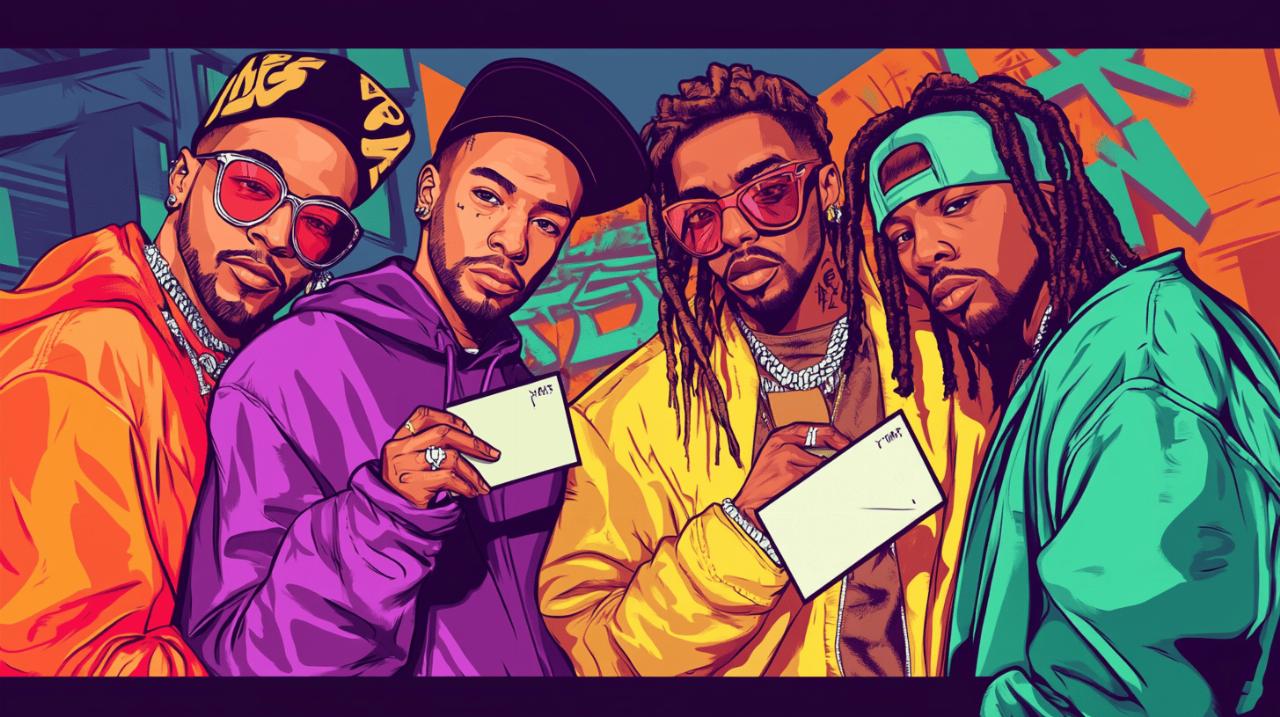The world of hip-hop is filled with larger-than-life personas, bold stage names, and unforgettable music. Yet behind every iconic alias lies a real person with a birth certificate and, in some cases, a stack of legal documents. When copyright disputes arise, these artists often find themselves stripped of their stage mystique, their legal identities laid bare in courtrooms and official filings. Understanding the real first names of rappers involved in major copyright ownership disputes reveals not only their personal histories but also the complex web of intellectual property battles that have shaped the music industry.
Birth names unveiled: the legal identities behind hip-hop's biggest catalogue battles
Copyright cases have long been a thorn in the side of musicians, and the hip-hop community is no stranger to these disputes. When royalties, sampling disputes, and music rights come into question, the individuals behind the stage names must step forward with their real identities. This is where birth names become more than just trivia; they become critical evidence in legal battles that can determine the fate of millions in earnings and future creative control.
Marshall Mathers and the Empire Records Controversy
Marshall Bruce Mathers III, known globally as Eminem, has been at the centre of numerous legal entanglements throughout his career. His rise to fame was meteoric, but with that success came scrutiny over his music, lyrics, and the ownership of his intellectual property. Eminem's battles have often revolved around the control of his master recordings and the royalties generated from his extensive catalogue. His real name frequently appears in court documents, where Marshall Mathers is listed as the plaintiff or defendant in disputes involving his record label, producers, and former associates. These cases highlight the tension between an artist's creative output and the corporate entities that seek to profit from it. The music industry exploitation that many rappers face is evident in these battles, where birth names serve as the legal anchor for claims and counterclaims.
Shawn carter's publishing rights showdown
Shawn Corey Carter, better known as Jay-Z, has built an empire not just through his music but through savvy business dealings and strategic partnerships. However, his journey has not been without its legal challenges. Jay-Z's involvement in copyright infringement cases and disputes over music rights has brought his real name into the public eye on multiple occasions. One notable instance involved a conflict over the ownership of his early recordings and the publishing rights associated with them. The complexities of his agreements with Def Jam and other entities have led to protracted legal battles where Shawn Carter's signature and legal identity were scrutinised to determine rightful ownership. These disputes underscore the importance of understanding the contracts and intellectual property laws that govern the music industry, as well as the personal toll such battles can take on artists who must see their birth names dragged through the legal system.
From Stage Monikers to Court Documents: When Real Names Surface in Royalty Disputes
When a rapper steps into a courtroom, the theatrical persona often fades, replaced by the stark reality of legal proceedings. The use of stage names in everyday life is a powerful tool for branding and identity, but in the eyes of the law, it is the birth name that holds authority. This transition from stage moniker to legal identity can be jarring, especially when the stakes involve significant financial compensation and creative control.
Calvin Broadus and the Master Recording Ownership Saga
Calvin Cordozar Broadus Jr., universally recognised as Snoop Dogg, has had a storied career marked by both musical innovation and legal disputes. His association with Death Row Records in the early days of his career set the stage for a series of conflicts over master recording ownership. Snoop Dogg's real name appears in numerous lawsuits related to the rights of his early albums, which were produced under controversial contracts. The battles over these master recordings have involved claims of exploitation and disputes over royalties, with Calvin Broadus often finding himself at odds with record executives and former collaborators. The saga of his fight to reclaim control of his music is a cautionary tale about the importance of retaining ownership of one's intellectual property. It also highlights the broader issue of music industry exploitation, where artists sign deals that heavily favour labels, only to spend years in court trying to reclaim what is rightfully theirs.
Curtis jackson's bankruptcy and intellectual property claims
Curtis James Jackson III, known to fans as 50 Cent, has experienced the highs and lows of fame in equal measure. His bankruptcy filing in 2015 brought his real name into the spotlight, not as a triumphant artist but as a debtor seeking financial protection. However, the bankruptcy proceedings also revealed the extent of his intellectual property holdings and the disputes surrounding them. Curtis Jackson's legal battles have included conflicts over the rights to his music, his brand, and even his likeness. These cases have involved complex negotiations with creditors, former business partners, and record labels. The use of his birth name in these proceedings underscores the fact that, despite his public persona, he remains accountable to the legal system and the contracts he signed. The intersection of bankruptcy and intellectual property law in his case serves as a stark reminder of the financial vulnerabilities that even successful artists can face, particularly when disputes over music rights and royalties are involved.
The identity crisis: how birth certificates become evidence in music industry litigation
 In the world of entertainment law, birth certificates and legal identification documents are often called upon as evidence. When copyright infringement is alleged or when ownership of a musical work is contested, the legal identity of the artist becomes a critical piece of the puzzle. This reliance on official documentation can feel invasive, but it is a necessary part of the legal process, ensuring that the correct parties are held accountable and that rights are properly assigned.
In the world of entertainment law, birth certificates and legal identification documents are often called upon as evidence. When copyright infringement is alleged or when ownership of a musical work is contested, the legal identity of the artist becomes a critical piece of the puzzle. This reliance on official documentation can feel invasive, but it is a necessary part of the legal process, ensuring that the correct parties are held accountable and that rights are properly assigned.
Aubrey graham's streaming revenue legal tangles
Aubrey Drake Graham, known simply as Drake, has become one of the most commercially successful artists of his generation. However, his success has not insulated him from legal disputes. Drake's real name has appeared in several lawsuits related to streaming revenue and the distribution of royalties. As the music industry has shifted towards digital platforms, questions about how streaming income is calculated and distributed have become increasingly contentious. Aubrey Graham's legal team has been involved in negotiations and disputes with record labels and streaming services to ensure that he receives his fair share of the revenue generated by his music. These cases often involve detailed financial analyses and the examination of contracts signed years earlier, with his birth name serving as the legal reference point. The complexity of streaming royalties and the opacity of the calculations used by platforms have made these disputes particularly challenging, highlighting the need for greater transparency and fairness in the digital age.
Kanye omari west's producer credit conflicts
Kanye Omari West, a name synonymous with both musical genius and controversy, has faced his share of legal battles over producer credits and intellectual property. His real name has been central to disputes involving the ownership of beats, samples, and production work. Kanye's career as both a producer and an artist has led to conflicts over who holds the rights to certain tracks, with accusations of copyright infringement and unauthorised use of samples frequently arising. The case of producer credit conflicts is particularly complex in hip-hop, where collaboration is common and the lines of ownership can become blurred. Kanye Omari West's legal identity has been scrutinised in court as lawyers and judges attempt to untangle the web of agreements, handshake deals, and informal collaborations that characterise the music industry. These disputes serve as a reminder of the importance of clear, written contracts and the need for artists to protect their intellectual property from the outset.
Behind the aliases: real first names that changed hip-hop's legal landscape
The real first names of rappers are more than just interesting trivia; they are the legal identities that anchor major copyright cases and influence the trajectory of the music industry. By examining the birth names of artists involved in significant disputes, we gain insight into the personal and professional challenges they face, as well as the broader systemic issues that plague the industry.
Andre Young and the Beats Electronics Trademark Battles
Andre Romelle Young, known to the world as Dr. Dre, has been a transformative figure in hip-hop, both as an artist and as a businessman. His involvement in Beats Electronics and the subsequent sale to Apple brought his real name into a series of trademark battles and intellectual property disputes. Andre Young's legal identity has been at the centre of conflicts over the ownership of the Beats brand, with former partners and collaborators claiming stakes in the company. These disputes have involved intricate negotiations and legal manoeuvres, with his birth name appearing on countless documents and filings. The success of Beats Electronics is a testament to Dr. Dre's business acumen, but it also illustrates the legal complexities that come with building a brand and protecting intellectual property. The battles over trademark rights and the division of profits have highlighted the importance of securing proper legal protection for business ventures and the potential pitfalls of informal agreements.
Sean combs' multiple entities and copyright complexities
Sean John Combs, known variously as Diddy, Puff Daddy, and P. Diddy, has built a multifaceted empire encompassing music, fashion, and spirits. His real name has been involved in a dizzying array of legal disputes related to copyright infringement, music rights, and the ownership of his various business entities. Sean Combs' legal battles have included conflicts over sampling disputes, where his use of other artists' work has been called into question, as well as disputes with former collaborators and record labels. The complexity of his business interests means that his birth name appears in a wide range of legal contexts, from music royalties to trademark disputes. The case of Sean Combs illustrates the challenges faced by artists who expand beyond music into other industries, as each new venture brings with it a fresh set of legal considerations and potential conflicts. His story is a testament to the importance of robust legal support and the need for clear agreements in all business dealings, particularly in the entertainment industry where intellectual property is both the product and the battleground.

